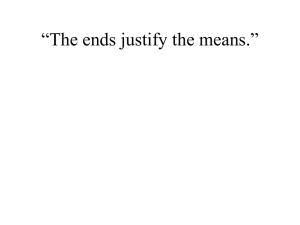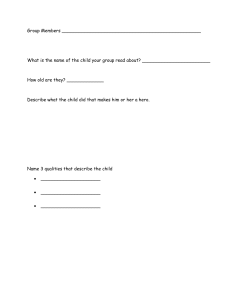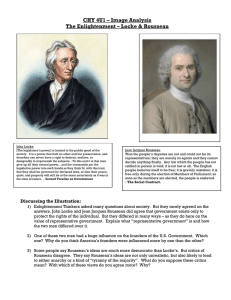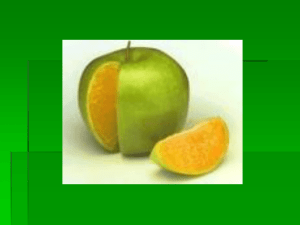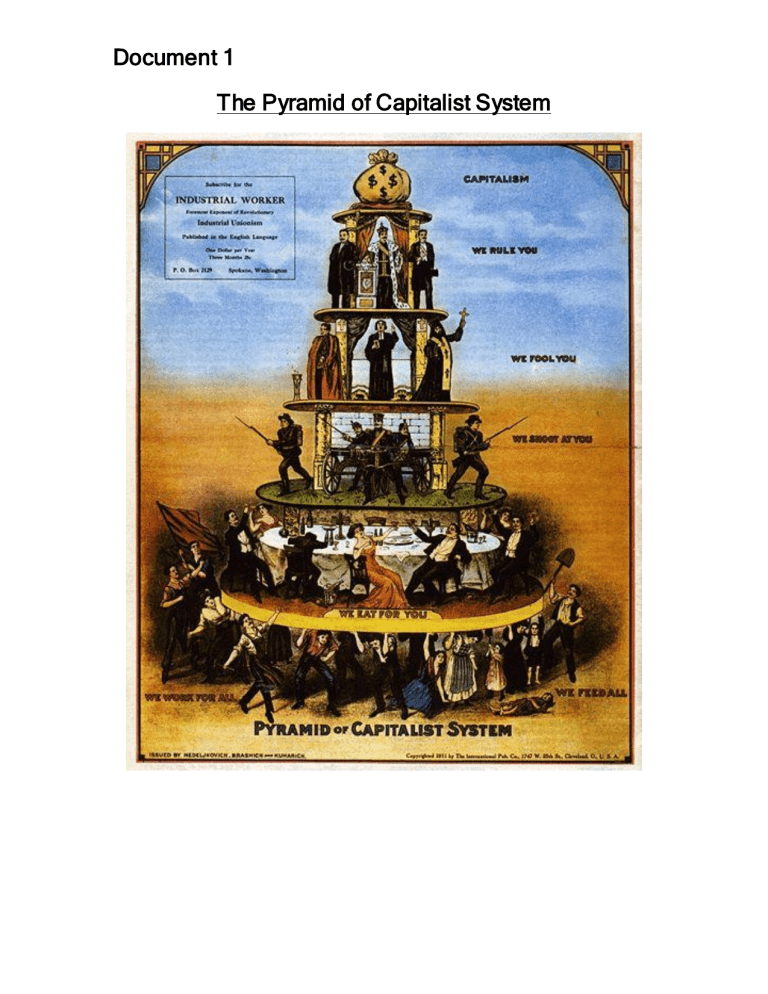
Document 1 The Pyramid of Capitalist System Document 2 Writings from Marx and Engels Excerpts from the Communist Manifesto by Friederich Engels and Karl Marx, 1848 “The modern bourgeois (middle class) society…has not done away with class antagonisms (hatred between groups of people). It has but established new forms of struggle in place of the old ones. Modern industry has converted the little workshop of the patriarchal (male) master into the great factory of the industrial capitalist. Masses of laborers, crowded into the factory, are organized like soldiers…. They are slaves of the machine and the manufacturer. Instead of rising as industry progresses, they sink deeper and deeper into poverty….” "Owing to the use of machinery and to division of labor, the work of the proletarians (worker class) has lost all individual character, and consequently, all charm for the workmen. He becomes [a limb] of the machine, and it is only the most simple, most monotonous (boring), and most easily acquired knack (skill or ability), that is required of him.” Excerpt from the Principles of Communism by Friedrich Engels, 1847 “Above all, [the government]… will have to take control of industry and of all the branches of production out of the hands of… competing individuals, and instead institute a system as a whole, that is for the common account (good), according to a common plan, and with the participation of all members of society. It will… abolish (eliminate) competition….Private property must therefore be abolished.” Document 3 Adam Smith Excerpts from The Wealth of Nations by Adam Smith, 1776 “The sole purpose of all production is to provide the best possible goods to the consumer at the lowest possible price. Society should assist producers of goods and services only to the extent that assisting them benefits the consumer… he [the consumer] intends his own gain; and he is in this, as in many other cases, led by an invisible hand to promote an end which was no part of his intention…. By pursuing his own interest, he frequently promotes that of the society....” “According to this liberal and generous system, therefore, the most advantageous method in which a landed nation can raise up artificers (craftsmen), manufacturers, and merchants of its own, is to grant the most perfect freedom of trade to artificers, manufacturers and merchants of all nations.” Excerpts from The Theory Of Moral Sentiments , Part VI, Section II, Chapter II, pp. 233-4, para 17. The man of system…is apt to be very wise in his own conceit; and is often so enamoured with the supposed beauty of his own ideal plan of government, that he cannot suffer the smallest deviation from any part of it… He seems to imagine that he can arrange the different members of a great society with as much ease as the hand arranges the different pieces upon a chess-board. He does not consider that in the great chess-board of human society, every single piece has a principle of motion of its own, altogether different from that which the legislature might choose to impress upon it. Text Dependent Questions: 1. In Wealth of Nations , what does Smith see as the role of government? 2. In The Theory if Moral Sentiments , what does Smith see as a problem between government and society? Document 4 The Purpose of Government John Locke "Government being for the preservation of every man's right and property, by preserving him from the violence or injury of others, is for the good of the governed.” (Locke,First Treatise, Chapter 9). Jean-Jacques Rousseau “What, then, is the government? An intermediary body established between the subjects and the sovereign for their mutual communication, a body charged with the execution of the laws and the maintenance of freedom, both civil and political.” (Rousseau, The Social Contract) John Stuart Mill The first element of good government, therefore, being the virtue and intelligence of the human beings composing the community, the most important point of excellence which any form of government can possess is to promote the virtue and intelligence of the people themselves. The first question in respect to any political institutions is, how far they tend to foster in the members of the community the various desirable qualities, moral and intellectual; …. The government which does this the best has every likelihood of being the best in all other respects, since it is on these qualities, so far as they exist in the people, that all possibility of goodness in the practical operations of the government depends. We may consider, then, as one criterion of the goodness of a government, the degree in which it tends to increase the sum of good qualities in the governed, collectively and individually; since, besides that their well-being is the sole object of government, their good qualities supply the moving force which works the machinery. (Mill, Representative Government) Text Dependent questions 1. What is the role of government according to John Locke? 2. According to Rousseau, what is the purpose of government? 3. How does Mill support the ideas of Rousseau and Locke? 4. In your opinion, in what areas do these philosophers agree?
